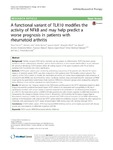A functional variant of TLR10 modifies the activity of NFkB and may help predict a worse prognosis in patients with rheumatoid arthritis

Ver/Abrir
Use este enlace para citar
http://hdl.handle.net/2183/25234
Excepto si se señala otra cosa, la licencia del ítem se describe como Creative Commons Attribution 4.0 International License (CC-BY 4.0)
Colecciones
- Investigación (FCS) [1293]
Metadatos
Mostrar el registro completo del ítemTítulo
A functional variant of TLR10 modifies the activity of NFkB and may help predict a worse prognosis in patients with rheumatoid arthritisAutor(es)
Fecha
2016-10-04Cita bibliográfica
Torices S, Julia A, Muñoz P, Varela I, Balsa A, Marsal S, Fernández-Nebro A, Blanco F, López-Hoyos M, Martinez-Taboada V, Fernández-Luna JL. A functional variant of TLR10 modifies the activity of NFkB and may help predict a worse prognosis in patients with rheumatoid arthritis. Arthritis Res Ther. 2016 Oct 4;18(1):221.
Resumen
[Abstract] Background. Toll-like receptor (TLR) family members are key players in inflammation. TLR10 has been poorly studied in chronic inflammatory disorders, and its clinical relevance in rheumatoid arthritis (RA) is as yet unknown. We aimed at identifying TLR10 variants within all coding regions of the gene in patients with RA as well as studying their functional and clinical significance.
Methods. TLR10 gene variants were studied by performing sequencing of 66 patients with RA and 30 control subjects. A selected variant, I473T, was then analyzed in 1654 patients and 1702 healthy control subjects. The capacity of this TLR10 variant to modify the transcriptional activity of nuclear factor kappa-light-chain-enhancer of activated B cells (NFkB) was determined by using a luciferase reporter assay and analyzing the expression of NFkB target genes by quantitative polymerase chain reaction. Differences between groups were analyzed by using the Mann-Whitney U test and the unpaired two-tailed Student’s t test.
Results. We detected ten missense variants in the TLR10 gene and focused on the I473T substitution based on allele frequencies and the predicted functional impact. I473T variant is not associated with susceptibility to RA, but it significantly correlates with erosive disease in patients seropositive for antibodies to citrullinated protein antigens (p = 0.017 in the total cohort and p = 0.0049 in female patients) and with a lower response to infliximab treatment as measured by the change in Disease Activity Score in 28 joints (p = 0.012) and by the European League Against Rheumatism criteria (p = 0.049). Functional studies showed that TLR10 reduced activation of the NFkB inflammatory pathway in hematopoietic cells, whereas the I473T variant lacked this inhibitory capacity. Consistently, after exposure to infliximab, cells expressing the I437T variant showed higher NFkB activity than cells carrying wild-type TLR10.
Conclusions. A TLR10 allelic variant, I473T, has impaired NFkB inhibitory activity and is highly associated with disease severity and low response to infliximab in patients with RA.
Palabras clave
TLR10 variant
NFkB
Rheumatoid arthritis
Infliximab
NFkB
Rheumatoid arthritis
Infliximab
Versión del editor
Derechos
Creative Commons Attribution 4.0 International License (CC-BY 4.0)
ISSN
1478-6354






